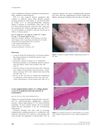 September 2003 in “Clinics in Family Practice”
September 2003 in “Clinics in Family Practice” Different hair diseases affect people during childbearing years, with treatments ranging from medication to psychological support.
 14 citations,
April 2016 in “British Journal of Dermatology”
14 citations,
April 2016 in “British Journal of Dermatology” The study found that the most common repigmentation pattern in children with vitiligo is a combination of patterns, with a new medium spotted pattern identified.
 December 2023 in “Aesthetic Cosmetology and Medicine”
December 2023 in “Aesthetic Cosmetology and Medicine” COVID-19 can cause hair loss, but specialists can help treat it.
[object Object] 22 citations,
January 2012 in “Mediators of inflammation” Nonantibiotic macrolides show promise for treating various inflammatory skin conditions.
 6 citations,
September 2012 in “Our Dermatology Online”
6 citations,
September 2012 in “Our Dermatology Online” Retinoids are effective for various skin conditions and hair loss but have serious side effects, so low doses are recommended.
7 citations,
July 2013 in “InTech eBooks” Oral lichen planus is a chronic disease causing mouth discomfort and sometimes needs immunosuppressive treatment.
 14 citations,
December 2010 in “Dermatologica Sinica”
14 citations,
December 2010 in “Dermatologica Sinica” New treatments for hair loss show promise, but more development is needed, especially for tough cases.
 84 citations,
April 2005 in “Dermatologic Clinics”
84 citations,
April 2005 in “Dermatologic Clinics” Treatments for melanin disorders exist, but more effective options needed.
54 citations,
June 2020 in “Pharmaceutics” New nanocarriers improve drug delivery for disease treatment.
 5 citations,
August 2003 in “British Journal of Dermatology”
5 citations,
August 2003 in “British Journal of Dermatology” Iron deficiency might contribute to hair loss in women.
 24 citations,
July 2019 in “Cochrane library”
24 citations,
July 2019 in “Cochrane library” Some treatments like methotrexate with prednisone might help juvenile morphea, but more research is needed to confirm.
 13 citations,
April 2022 in “Frontiers in oncology”
13 citations,
April 2022 in “Frontiers in oncology” Melanoma development can be linked to the breakdown of skin's melanin-producing units.
 1 citations,
October 2021 in “Jundishapur Journal of Natural Pharmaceutical Products”
1 citations,
October 2021 in “Jundishapur Journal of Natural Pharmaceutical Products” Ficus carica leaf extract may help treat melanoma by promoting cancer cell death without harming normal cells.
 July 2023 in “IntechOpen eBooks”
July 2023 in “IntechOpen eBooks” New treatments for alopecia areata show promise, but more research is needed to confirm their effectiveness.
 January 2023 in “Skin appendage disorders”
January 2023 in “Skin appendage disorders” Laser treatment for hair loss works equally well on different skin types, but more research is needed for very dark skin.
[object Object] September 2013 in “Canadian Medical Association Journal” Alopecia areata causes sudden hair loss, often resolves within a year, but can recur.
 7 citations,
September 2008 in “Dermatologic surgery”
7 citations,
September 2008 in “Dermatologic surgery” Hair transplantation can successfully treat stubborn alopecia areata.
8 citations,
July 2001 in “JEADV. Journal of the European Academy of Dermatology and Venereology/Journal of the European Academy of Dermatology and Venereology” New treatments for vitiligo show promise but still face challenges, especially for hands and feet.
 January 2020 in “Elsevier eBooks”
January 2020 in “Elsevier eBooks” Plant-based chemicals may help hair growth and prevent hair loss but need more research to compete with current treatments.
 March 2019 in “Journal of Investigative Dermatology”
March 2019 in “Journal of Investigative Dermatology” Seborrheic dermatitis is influenced by diet, genetics, and psychological factors.
 29 citations,
June 2013 in “Journal of the Saudi Society of Dermatology & Dermatologic Surgery”
29 citations,
June 2013 in “Journal of the Saudi Society of Dermatology & Dermatologic Surgery” Alopecia areata is an autoimmune hair loss condition treated with corticosteroids, and histologic confirmation is the best diagnosis method.
 19 citations,
August 2010 in “Journal der Deutschen Dermatologischen Gesellschaft”
19 citations,
August 2010 in “Journal der Deutschen Dermatologischen Gesellschaft” Certain plant extracts can effectively treat skin conditions like athlete's foot, chronic vein problems, sun damage, skin growths, vitiligo, and hair loss, and may also improve skin appearance.
 5 citations,
January 2010 in “International journal of trichology”
5 citations,
January 2010 in “International journal of trichology” PUVASOL might effectively treat complete scalp baldness.
 63 citations,
December 2002 in “Archives of Dermatology”
63 citations,
December 2002 in “Archives of Dermatology” The 308-nm excimer laser is a promising treatment for vitiligo with varying success and mild side effects.
 12 citations,
May 1989 in “Postgraduate Medicine”
12 citations,
May 1989 in “Postgraduate Medicine” The document concludes that hair loss is common and can be treated with medications like minoxidil or surgical options, and it significantly affects people's psychological well-being.
 July 2004 in “British Journal of Dermatology”
July 2004 in “British Journal of Dermatology” The document concludes that accurate diagnosis and treatment are crucial in dermatology, and it presents various findings on skin conditions and treatments.
 164 citations,
April 2008 in “Cochrane library”
164 citations,
April 2008 in “Cochrane library” Current treatments for alopecia show no significant long-term benefits.
 7 citations,
September 2013 in “Current Dermatology Reports”
7 citations,
September 2013 in “Current Dermatology Reports” Some skin medications are safe for pregnant women, but others pose risks or should not be used.
 24 citations,
September 2008 in “Clinical and experimental dermatology”
24 citations,
September 2008 in “Clinical and experimental dermatology” Repigmentation in vitiligo may come from melanocyte stem cells in the skin.
 4 citations,
September 2014 in “Elsevier eBooks”
4 citations,
September 2014 in “Elsevier eBooks” Use some skin medications with caution during pregnancy; avoid strong steroids, certain eczema treatments, and systemic retinoids, but many topical treatments and nasal sprays are safe.

























